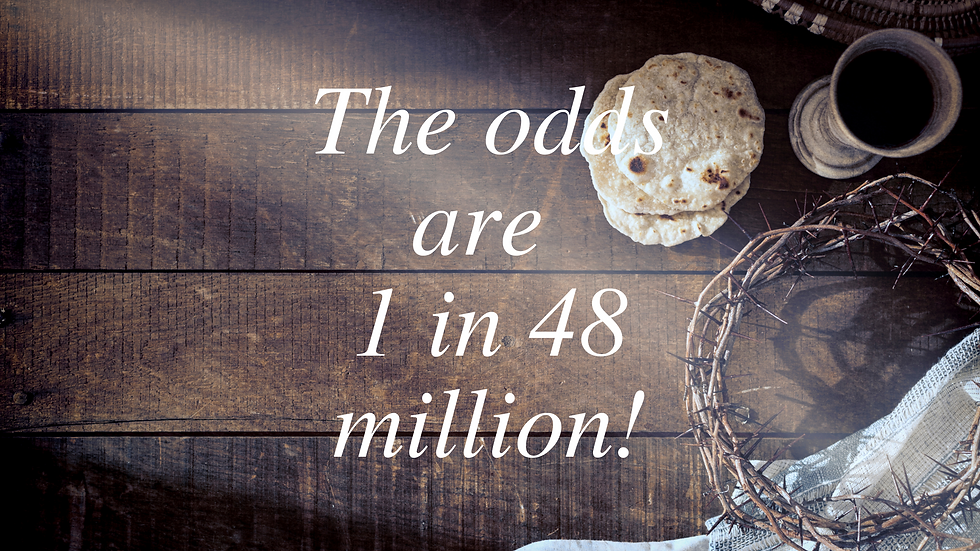A 1 in 48 million chance: Yeshua Dying, Rising and Pouring out His Spirit on Jewish Holy Days!
- Ron Cantor

- Nov 15, 2021
- 4 min read
Updated: Mar 19, 2024

I am not a mathematician and don’t want to be. But let me ask you a question...
What are the odds that Yeshua died on a Jewish holiday, rose on a Jewish holiday, and birthed the New Testament congregation on a Jewish holiday?
So that we are all clear as to what I am referring to:
Yeshua died on Passover. The very day when all Israel commemorates the first Passover when they sacrificed an innocent lamb and took its blood and applied it to the doorpost of their homes to protect them from the angel of death.
He rose on the day that the Israelites brought the first fruits offering of barely (Lev. 23:10). This is called the "Head of the Harvest" (Rashit Hakatzir). The Israelites then counted off seven weeks until the next festival. These days are referred to as "the counting of the Omer (sheaf)."
Then, the Spirit of God was poured out in Jerusalem on the last day of counting the Omer, the 49 days between the first fruits barely offering and Shavuot (Pentecost), where we bring the first fruits of the wheat harvest.
So, imagine that we took the 365 days that comprise a year and laid them out on a roulette wheel. Next, we marked Passover, First Fruits (barley), and Shavuot (wheat). The first ball you throw must land on Passover, the next on First Fruits, and the final ball on Shavuot.

One in Forty-Eight Million
Okay, as I said, I am no mathematician or oddsmaker, but I think the chances of that happening 3 times in a row are 365 to the third degree, or 1 in 48,627,125. In fact, the only way it could conceivably happen would be if someone were planning it. And of course, that is what I am hinting at—God purposely had these events fall on Jewish holy days to emphasize to generations to come that "salvation is of the Jews" (John 4:22).
To be clear, Jews are not inherently better or more valuable to God than non-Jews. God hates any attitudes of racial superiority. To be great in the kingdom is to serve others and live a life of humility, preferring others. Yeshua demonstrated that perfectly (Phil. 2:1-11). The Good News of Yeshua is for every nation, but God would have those nations remember their roots, and pray for and bless Israel, who, for the most part, has fallen away.
The Church, for the better part of 1,900 years, was a hostile witness of the true Jesus to the Jewish people, with Jews being accused of killing God, of being demonic, not being fully human, not redeemable, persecuted, expelled (from their homes and countries) and even murdered in the name of the Church.
But it was thousands of Jews, like Simeon and Anna, who interceded for the coming of Messiah time and Jewish prophets who foretold how he would die for Israel and the nations. Oh that the church would understand this and pray and intercede for Israel's salvation.
Now, let’s take a deeper look at these days.
Yeshua died on Passover
The Last Supper was actually the last Seder (meal on the first night of Passover). The practice of communion, the drinking of wine, and the eating of bread, symbolizing the body and blood of Yeshua, was instituted on Passover. It was during the Seder that He took the third cup of wine, the Cup of Redemption, and instituted the tradition. While many churches use bread for this practice, there was a reason that Yeshua used matzah, bread without leaven. Leaven symbolizes sin. Yeshua was pure, without sin, and therefore, matzah would have been the only appropriate type of bread to use.
Yeshua rose from the Dead on First Fruits
The Bible teaches that the first Sunday, after the first Shabbat, after Passover begins, would be the day of the first fruits barely offering, called Rashit haKatzir. It was a time to thank God for the first fruits of the harvest. This is why Paul referred to Yeshua as the “first fruits from among the dead” (1 Cor. 15:20). How fitting that God chose this day of all days to bring forth the Messiah from the grave.
The outpouring of the Holy Spirit on the first Jewish believers happened on Shavuot
Most Christians know this Hebrew feast day's Greek name: "Pentecost.” Pentecost means fifty or fiftieth in Greek. But in Hebrew, it is Shavuot, or Weeks (as in seven weeks). Jews would count the days from the first fruit offering to Shavuot. Since the first fruit offering was always on a Sunday, technically, Shavuot should also be on a Sunday. You count 49 days, and then the next day is Shavuot.
Many Christians are unaware that Shavuot (Pentecost) was an ancient Jewish feast day or Mo'edim (appointed times). God was strategic in His timing, knowing that there would be hundreds of thousands of Jewish pilgrims from other countries in Jerusalem for the feast. Those were the Jews who were "cut to the heart" by Peter's message (Acts 2:37). And they took the gospel of Yeshua back home to their communities.
God chose three Jewish feast days for the sacrificial death of His Son, the resurrection of His Son, and the outpouring of His Spirit, thus birthing the first assembly of believers in the Messiah (Acts 2). Why do you think he did that?














Comments